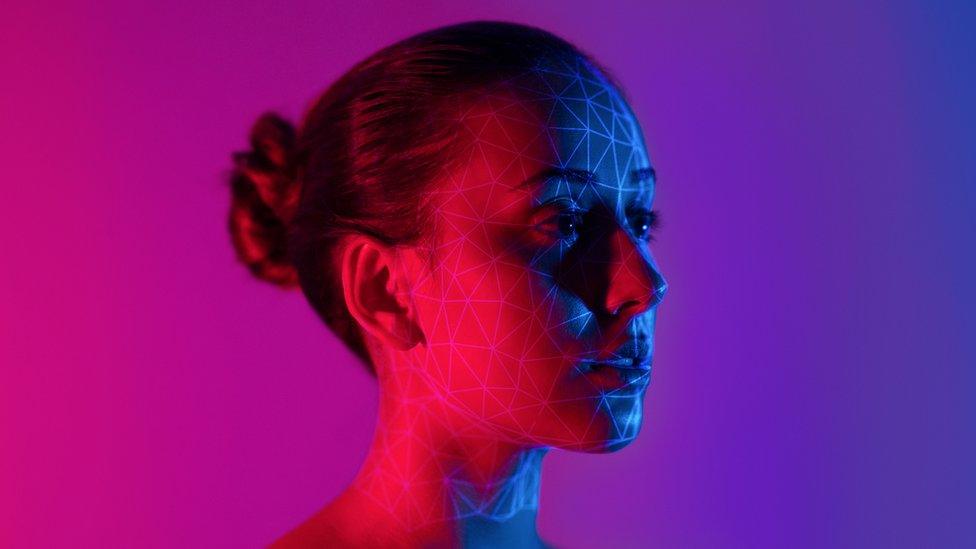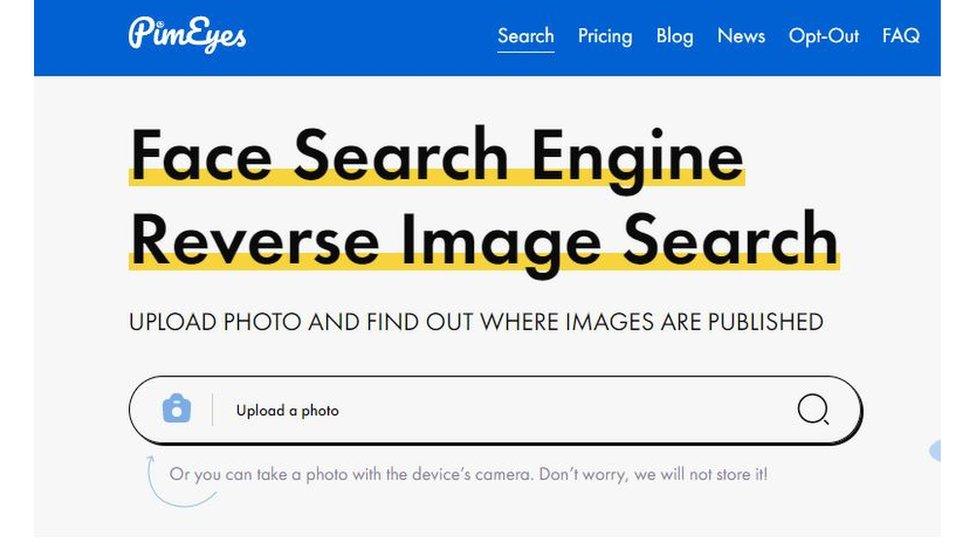Stalking fears over PimEyes facial search engine
- Published

Privacy campaign group Big Brother Watch has made a complaint against face recognition search engine PimEyes.
PimEyes enables people to look for faces in images which have been posted publicly on the internet.
Big Brother Watch claims it facilitates stalking and has complained to the UK data and privacy watchdog.
But PimEyes' chief executive Giorgi Gobronidze says it poses fewer risks related to stalking than social media or other search engines.
Mr Gobronidze told the BBC that because PimEyes only searches images posted publicly anyone misusing it "gets only the information available on the open internet".
Enabling surveillance
Big Brother Watch's complaint to the Information Commissioner's Office (ICO) claims that PimEyes has enabled "surveillance and stalking on a scale previously unimaginable".

Starting with a person's picture, PimEyes finds other photos of them published online. This could include images on photo-sharing sites, in blog posts and news articles, and on websites.
Big Brother Watch says that by piecing together information associated with these images - for example the text of a blog post, or a photo on a workplace website - a stalker could work out a person's "place of work, or indications of the area in which they live".
"Images of anyone, including children, can be scoured and tracked across the internet," wrote Madeleine Stone, legal and policy officer at Big Brother Watch, as she announced the complaint.
She argued the tool could be secretly used by potential employers, university admissions officers, domestic abusers or stalkers, and said it threatened to "end anonymity as we know it".
The campaigners accuse PimEyes of unlawfully processing the biometric data of millions of UK citizens - arguing it does not obtain permission from those whose images are analysed.
However, PimEyes told the BBC it was technically impossible to tell how many UK citizens' faces it has analysed.
Mr Gobronidze also responded to accusations his search engine broke data protection law. He claimed it was "technically impossible to reconstruct a single photo" from the data the company held, "even if we put our entire database on the open web".
No surveillance
To make full use of PimEyes, users need to take out one of three types of paid subscription.
In its terms and conditions, the site says it is intended to allow people to search for publicly available information about themselves.
"PimEyes is not intended for the surveillance of others and is not designed for that purpose," it says.
But Big Brother Watch claims there are no safeguards against this. There has also been concern that the tool could be used to uncover the real identity of sex workers.
However Mr Gobronidze claims that PimEye's "data security unit" looks for suspicious activity, for example if a male user always looks for female individuals, or a user uploads a photo of a child.
And the site does allow people to opt out of their image appearing in results.

The company argues that there are positive uses of the tool, telling the BBC that it:
assists investigative journalists
is negotiating with German, Italian, UK and US law enforcement to assist in combating crimes against children, human trafficking, and terrorism
had helped women and girls remove thousands of images related to non-consensual pornography
worked with humanitarian organisations on the investigation of war crimes and crimes against humanity in Ukraine
However, another face recognition search engine has found itself in legal hot water.
ClearviewAI's tool is not usable by the general public, and the firm says it is only available to law enforcement. Nonetheless it faced a £7.5m fine from the Information Commissioner's Office (ICO)., external
Responding to Big Brother Watch's call for an investigation the ICO said "We are aware of this matter and we are assessing the information provided."
- Published13 April 2022

- Published11 June 2020
